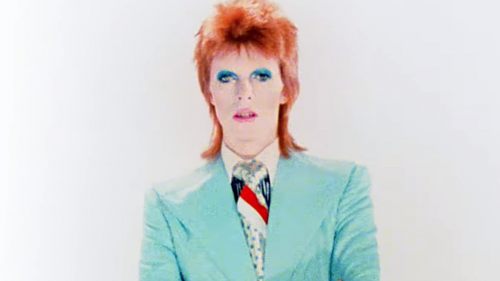And I Don’t Love You: Playing House With THE MAN WHO FELL TO EARTH
Thomas Jerome Newton (David Bowie), the title character of The Man Who Fell To Earth, is an alien. He’s come here on a mission to save his dying planet. Upon arrival, he pawns a seemingly endless supply of gold rings, uses the money to start a corporation that will make him a tech billionaire...and sets up house with Mary-Lou (Candy Clark), a simple motel chambermaid with whom he lives as husband and wife for a number of years. That's a curious narrative wrinkle that quietly turns into the film's melancholy core.
Newton seems more amused than smitten by Mary-Lou, smiling in his motel room while she prattles on. And he’s pretty honest with her: he tells her he’s married, but she takes it in stride. “But I’ll do for now, won’t I?” she offers optimistically. It’s established early on - and repeated - that Newton does not possess the same kind of emotions as humans. He loves his family, but passion and hatred are foreign to him, and human connection seems to not be an option. So his relationship with Mary-Lou is a quietly passive one; he’s present for decorating chats, or drives in the country, or sharing bottles of vodka, but emotionally he’s terminally unavailable. So why does he partner with her? It in no way furthers his cause or helps his mission. Is it an effort to blend in, to appear "normal"? He almost seems to take Mary-Lou as a common-law wife in a hollow attempt to replicate human behavior.
But Mary-Lou is all woozy emotion, doting over Newton and seeking his approval, introducing him to (and getting him hooked on) booze, all in service of trying to please him. Their relationship soon devolves into lots of day drinking, with Mary-Lou tearily shouting at him as he refuses to look up from the television(s). His truth is quite literally alien to her, so instead of letting her in he shuts down completely, because where would one start? Better to have another drink and see what’s on. She continues to push, and finally Newton decides to drop his mask and open up to her. He pulls off his nipples, his hair, his human contact lenses and his ears, and decides to let his wife see the real him.

That’s met with a big NOPE from Mary-Lou, who turns white with shock and pisses herself in terror. After pushing Newton to show her his true self, every cell in her body just wants him to go back to the way he was. She eventually collects herself and tries to make love to him in his true form, but ultimately can’t bring herself to do it. (As it involves strange, foamy skin secretions, it's safe to say she is literally unable to have sex with him.) This is a pretty cynical view about how much honesty a relationship can really endure! Newton’s final mystery dissolved, the couple stands on a dock and sifts through the ashes of a relationship immolated on a pyre of truth. “I don’t love you anymore,” she tells him. “And I don’t love you,” he says, but not as a retort. He was never able to love her and never pretended otherwise. And when he tried, it turned out they were just biologically, cosmically incompatible.
For years, Americans watched The Man Who Fell To Earth and maybe wondered about the point of this strange, chilly relationship. For all the film’s themes about corruption (of the individual, of the corporation, of the government, of the planet), lots of real estate is devoted to this detached, one-sided romance. Mary-Lou sort of disappeared from the film after that moment on the dock, her story - or the point of her story, at any rate - left somewhat dangling. But the complete version of the film restores the conclusion of this arc, and it’s maybe an even more cynical view of their relationship than what came before.
After leaving Newton, Mary-Lou is shown vaguely colluding with the government, somehow complicit in his discovery and capture. Her role in this isn’t entirely clear, because nothing in this blessed film is entirely clear, but she receives a sum of money for selling her lover down the river. Imprisoned by the government (who are threatened more by his business monopolies than his extraterrestrial mission - like Mary-Lou, more interested in his lie than his truth), Newton is locked up in a phony apartment and intermittently experimented on.
Years later, Newton is visited by Mary-Lou one last time. Age is taking its toll on her, and she’s gotten plump off her thirty pieces of silver. But her Tommy looks exactly the same, because don’t our true loves always look as beautiful as the day we met them? With the man who couldn’t fall in love perfectly punished and preserved in this penthouse menagerie, Mary-Lou is lost in a drunken fantasy.

Just as in reality, the sex is the last thing to die off in this relationship, and the two share an ugly, debauched final night together, full of unglamorous full-frontal nudity and loveless sex, with a gun-toting Newton faking an anger toward her about as well as he was able to mimic intimacy. (Like his apartment, and his eyes, and his hair, the gun he points at her is a useless fake.) She leaves him again - for his best friend, no less - and Thomas Jerome Newton is eventually abandoned even by his captors, left with nothing but the bad habits introduced to him by the woman who claimed to love him.
Is director Nicolas Roeg punishing Newton for playing house, for going through the motions of human interaction without really feeling it? Or is he sympathizing with a character who is being penalized by callous, ugly humans for simply trying to do what's expected of him? Either reading is possible; a cursory glance at Wikipedia shows that Roeg was divorced a year after making the film.



